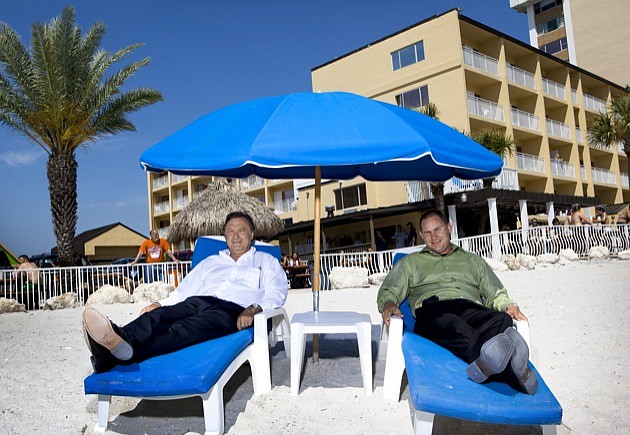- November 24, 2024
-
-
Loading

Loading

Most of us tend to steer clear of hotels that appear shabby or have service below basic standards. Gilles Arditi looks at those and sees opportunity.
The president of Indian Shores-based Southwind Hospitality LLC is in the seemingly growing business of turning hotels around from a struggling industry in Florida and nationwide. The firm, which includes partners Chad Coldren and Stephen Page, specializes in managing properties in foreclosure or receivership, sometimes stepping in before they reach that point.
Southwind, established last September, addresses the basic aspects of hotel operation, such as safety of the premises and time spent turning rooms, to outside issues like exposure on Internet booking sites and supplier contracts.
“The rooms are where the money is made,” says Arditi, who has more than 20 years of hospitality management experience and most recently was a regional vice president of operations with Dallas-based Prism Hotels & Resorts. “The easiest part is to cut costs, but the most difficult part is to grow revenue.”
So far, Southwind has taken on management at four hotels in the Tampa Bay area: Economy Inn, Inn on the Beach and Quality Hotel on the Beach, all in Clearwater; and Surf's Inn in Madeira Beach. In March, it took over the Howard Johnson Inn & Suites in Jacksonville after recommending changes a month earlier that led to a 65% increase in occupancy and 25% higher revenue.
Some fixes are simple, according to Arditi. For instance, it should take housekeepers no more than a half-hour to clean each room. For guests staying longer than one night, green initiatives such as skipping linen or towel changes can help save time, and there are also environmentally friendly methods of cleaning bathrooms that save time and money.
Once new management is installed at a hotel, Southwind goes through its own checklist of possible changes, such as determining whether there are too many staffers for average occupancy or whether contracts for supplies and services should be renegotiated. These changes are hardly noticeable to guests if done correctly, Arditi says.
“Our responsibility is to cash flow the property,” he says. However, he adds that it is also the manager's responsibility to let an owner know whether the efforts are a lost cause and that a hotel would need to be locked up completely.
Arditi and his partners — Coldren, vice president of operations and a certified hotel administrator, and Page, a veteran real estate developer who funded Southwind's startup -- have been able to boast prior success with hotel turnarounds. At the Quality Beach Resort in Clearwater Beach, an e-commerce strategy was put in place resulting in more than $1.5 million in new revenue from Expedia last year.
Targeting hotels to nearby businesses also works to generate room nights, Arditi advises. For example, the Economy Inn accessed businesses within a five-mile radius, including MarineMax, a Clearwater dealer of yachts and other large boats whose out-of-town customers and personnel need a place to stay.
“The owners have to find a niche for their hotels,” says Arditi, whose firm began managing the hotel in January. Often that goes beyond tourism — hotels along the Gulf Coast may enjoy a boost from winter tourism or Major League Baseball spring training, but that's only good for a few months of an entire year, he points out.
Bay area hotels appear to be faring better than those across the country, though the numbers still aren't overly impressive. Smith Travel Research of Hendersonville, Tenn., reports the Tampa-St. Petersburg market averaged 63% occupancy in this year's first quarter, well above the 52% national average, but the average daily rate was barely above $100 per night and revenue per available room was down 12% over the year to $64.
Nature plays a role in moving those numbers one way or the other. An unseasonably cold winter kept many tourists off the beaches earlier this year, yet the Icelandic volcano kept some European visitors from returning home from their Florida vacation in mid-April.
In the longer term, Arditi believes the hotel industry will need up to two more years to revive from its current slump. While some hotels are opening restaurants or bars to attract local business, he says it isn't enough to sustain operations as much as actual heads in beds. Boutique hotels may attract a younger demographic willing to spend a little extra per night for accommodations, but that works only for select properties, he adds.
The one glaring difference Arditi sees between the current recession and others affecting hotels in the last few decades is that “business was still being done then.”
— Carl Cronan